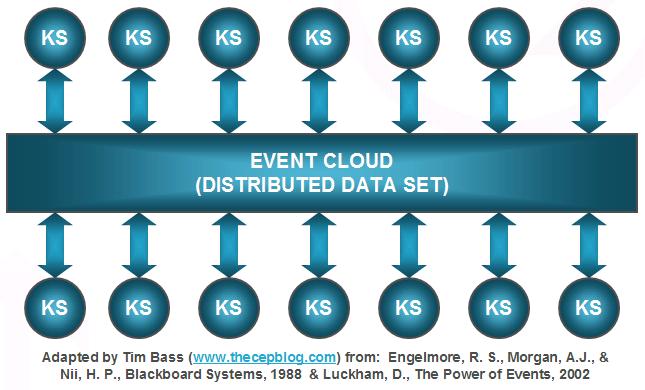|
|
#
1
Registered User
26,240,
27


Join Date: Sep 2000
Last Activity: 1 August 2008, 3:09 PM EDT
Posts: 26,240
Thanks Given: 0
Thanked 27 Times in 26 Posts
A Model For Distributed Event Processing
Tim Bass
Thu, 01 Nov 2007 12:15:53 +0000
In my last post, Analytical Patterns for Complex Event*Processing, I provided an overview of a few slides I presented in March of 2006 at*first event processing symposium*titled*Processing Patterns for Predictive Business.* In that same presentation (slide 15), I also introduced*a generic*high level architecture (HLA)*for event processing in the illustration below:
The figure above is a application of historical work,*more than a decade ago,*in distributed blackboard architectures applied to complex event processing.
The genesis of the*blackboard architectural concept*was in*the field of Artificial Intelligence (AI) to address issues of information sharing among multiple heterogeneous problem-solving agents.***As the name suggests,* the term “blackboard architecture”*is a processing metaphor*where intelligent agents*collaborate around a blackboard to solve a complex problem.
Basically, the HLA consists of*two key functional elements, (1) distributed data set (the “blackboard”) and “knowledge sources” (KS) that function as (self actuated or orchestrated) intelligent agents working together to solve complex problems.**
When I was first introduced to Dr. David Luckham’s book, The Power of Events: An Introduction to Complex Event Processing in Distributed Enterprise Systems, I*immediately understood*that distributed (complex) event processing, which included an event processing network* (EPN) and collaborative distributed event processing agents (EPAs), follow the same generic architectual pattern as other distributed, collaborative problem-solving software architectures. This also made perfect sense to me*considering Dr. Luckham’s strong background in AI at Stanford.
In a nutshell, in my mind, “CEP engines” should operate as intelligent agents collaborating to solve complex distributed computing problems.** Professionally, I have much*stronger interest in collaborative distributed agent-based*network computing that stand-alone event processing.
An exciting complimentary technology for complex event processing*is distributed object*caching and grid computing, which I will discuss in more detail in a later post.* Together, these architectures, analytics*and technologies help*paint a*total picture of the future of event processing, at least in my mind.
Source...
Thu, 01 Nov 2007 12:15:53 +0000
In my last post, Analytical Patterns for Complex Event*Processing, I provided an overview of a few slides I presented in March of 2006 at*first event processing symposium*titled*Processing Patterns for Predictive Business.* In that same presentation (slide 15), I also introduced*a generic*high level architecture (HLA)*for event processing in the illustration below:
The figure above is a application of historical work,*more than a decade ago,*in distributed blackboard architectures applied to complex event processing.
The genesis of the*blackboard architectural concept*was in*the field of Artificial Intelligence (AI) to address issues of information sharing among multiple heterogeneous problem-solving agents.***As the name suggests,* the term “blackboard architecture”*is a processing metaphor*where intelligent agents*collaborate around a blackboard to solve a complex problem.
Basically, the HLA consists of*two key functional elements, (1) distributed data set (the “blackboard”) and “knowledge sources” (KS) that function as (self actuated or orchestrated) intelligent agents working together to solve complex problems.**
When I was first introduced to Dr. David Luckham’s book, The Power of Events: An Introduction to Complex Event Processing in Distributed Enterprise Systems, I*immediately understood*that distributed (complex) event processing, which included an event processing network* (EPN) and collaborative distributed event processing agents (EPAs), follow the same generic architectual pattern as other distributed, collaborative problem-solving software architectures. This also made perfect sense to me*considering Dr. Luckham’s strong background in AI at Stanford.
In a nutshell, in my mind, “CEP engines” should operate as intelligent agents collaborating to solve complex distributed computing problems.** Professionally, I have much*stronger interest in collaborative distributed agent-based*network computing that stand-alone event processing.
An exciting complimentary technology for complex event processing*is distributed object*caching and grid computing, which I will discuss in more detail in a later post.* Together, these architectures, analytics*and technologies help*paint a*total picture of the future of event processing, at least in my mind.
Source...
